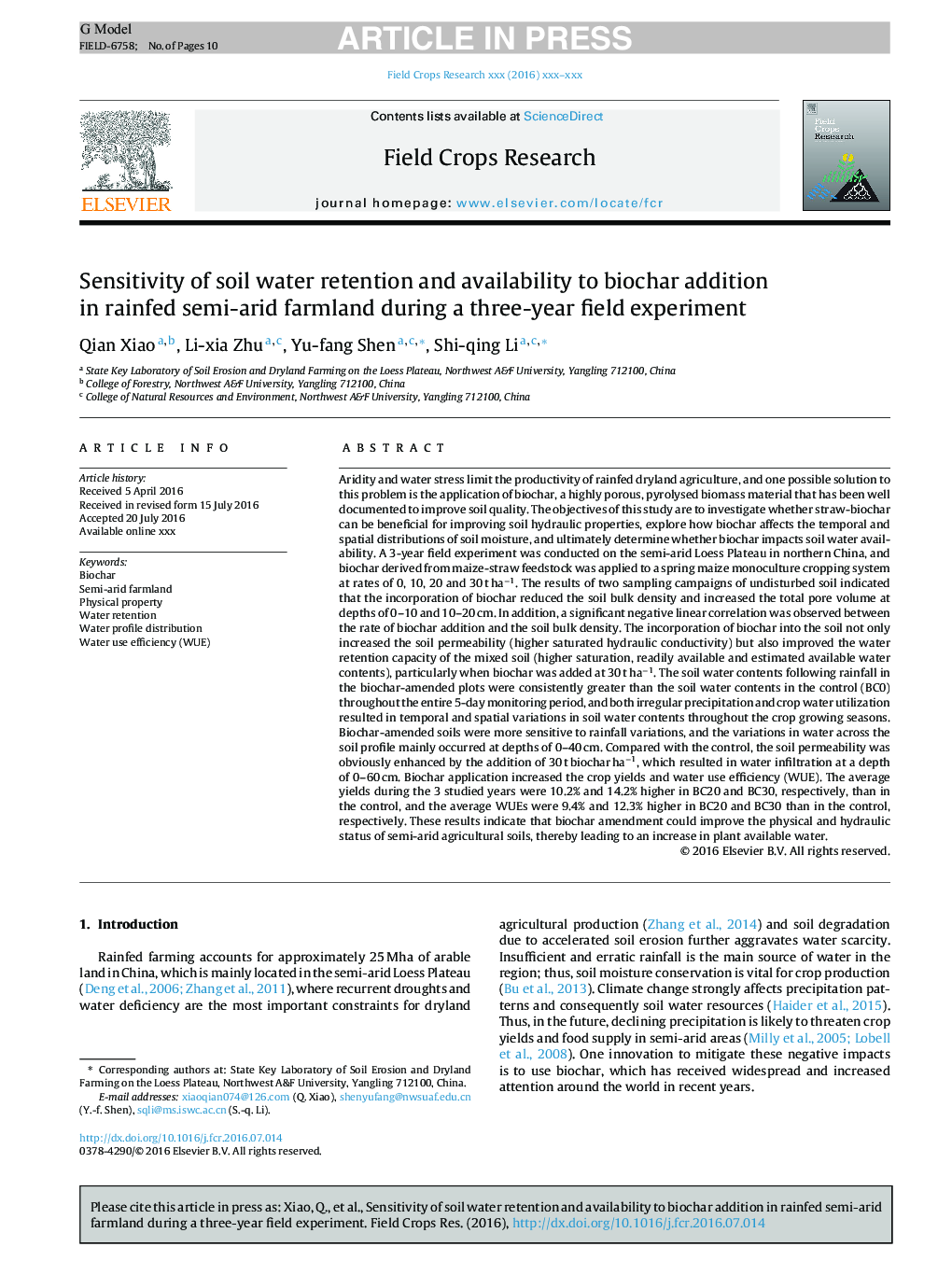| کد مقاله | کد نشریه | سال انتشار | مقاله انگلیسی | نسخه تمام متن |
|---|---|---|---|---|
| 6374546 | 1624667 | 2016 | 10 صفحه PDF | دانلود رایگان |
عنوان انگلیسی مقاله ISI
Sensitivity of soil water retention and availability to biochar addition in rainfed semi-arid farmland during a three-year field experiment
ترجمه فارسی عنوان
حساسیت احتباس آب خاک و دسترسی به افزودنی زیست تخریبی در مزرعه دیم زده نیمه خشک مزرعه در طی یک آزمایش سه ساله
دانلود مقاله + سفارش ترجمه
دانلود مقاله ISI انگلیسی
رایگان برای ایرانیان
کلمات کلیدی
موضوعات مرتبط
علوم زیستی و بیوفناوری
علوم کشاورزی و بیولوژیک
علوم زراعت و اصلاح نباتات
چکیده انگلیسی
Aridity and water stress limit the productivity of rainfed dryland agriculture, and one possible solution to this problem is the application of biochar, a highly porous, pyrolysed biomass material that has been well documented to improve soil quality. The objectives of this study are to investigate whether straw-biochar can be beneficial for improving soil hydraulic properties, explore how biochar affects the temporal and spatial distributions of soil moisture, and ultimately determine whether biochar impacts soil water availability. A 3-year field experiment was conducted on the semi-arid Loess Plateau in northern China, and biochar derived from maize-straw feedstock was applied to a spring maize monoculture cropping system at rates of 0, 10, 20 and 30 t haâ1. The results of two sampling campaigns of undisturbed soil indicated that the incorporation of biochar reduced the soil bulk density and increased the total pore volume at depths of 0-10 and 10-20 cm. In addition, a significant negative linear correlation was observed between the rate of biochar addition and the soil bulk density. The incorporation of biochar into the soil not only increased the soil permeability (higher saturated hydraulic conductivity) but also improved the water retention capacity of the mixed soil (higher saturation, readily available and estimated available water contents), particularly when biochar was added at 30 t haâ1. The soil water contents following rainfall in the biochar-amended plots were consistently greater than the soil water contents in the control (BC0) throughout the entire 5-day monitoring period, and both irregular precipitation and crop water utilization resulted in temporal and spatial variations in soil water contents throughout the crop growing seasons. Biochar-amended soils were more sensitive to rainfall variations, and the variations in water across the soil profile mainly occurred at depths of 0-40 cm. Compared with the control, the soil permeability was obviously enhanced by the addition of 30 t biochar haâ1, which resulted in water infiltration at a depth of 0-60 cm. Biochar application increased the crop yields and water use efficiency (WUE). The average yields during the 3 studied years were 10.2% and 14.2% higher in BC20 and BC30, respectively, than in the control, and the average WUEs were 9.4% and 12.3% higher in BC20 and BC30 than in the control, respectively. These results indicate that biochar amendment could improve the physical and hydraulic status of semi-arid agricultural soils, thereby leading to an increase in plant available water.
ناشر
Database: Elsevier - ScienceDirect (ساینس دایرکت)
Journal: Field Crops Research - Volume 196, September 2016, Pages 284-293
Journal: Field Crops Research - Volume 196, September 2016, Pages 284-293
نویسندگان
Qian Xiao, Li-xia Zhu, Yu-fang Shen, Shi-qing Li,
